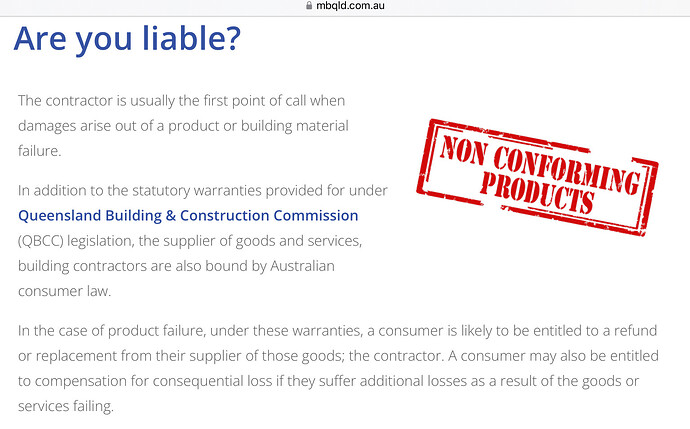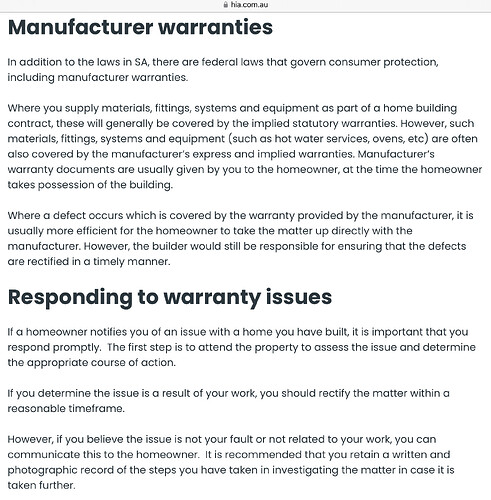Just had an issue with a five year old house: a solar hot water system, gas boosted, failed due to a broken hot sensor wire, and a leaking water join, all on the roof, close to the solar panel. My plumber has shut off the water, while she ascertains the manufacturer’s warranty. My builder claims the warranty is up the supplier, and leaves it to us. Surely as my builder built the house, and as they contracted with all their suppliers, why do I have to follow up with the supplier company and wear their decision?
Welcome to the community @DrDave
The following advice by the Master Builders QLD to its members says it is the builder’s responsibility to the home owner. Australian Consumer Law, is the basis of the advice.
If you cannot find similar online for your state/territory, you are welcome to share the respective government details. Although the ACL is not specific to state or territory.
EG
Victoria - Warranties and guarantees on building - Consumer Affairs Victoria
It’s more than 20 years since we last had a new build. Our experience is the larger the builder the more difficult they can be when it comes to support or warranties once the keys have been handed over.
I had a similar issue with an insurance claim some years ago. The insurer took control of the claim and passed the vehicle to the various workshops that performed some of the repairs. When there was a problem with the repair, I contacted the insurer, and was put onto the claim manager. He tried to fob me off to the repairer.
I explained that I only had a contract with the insurer, and if the problem was with his sub-contractor or supplier, then it is up to him to resolve it. He argued that the insurer only funds the repairs as a pass-through, ignoring the fact that they unilaterally decided what repairs were required, and who to let the work to. That makes them the prime contract repairer.
The fact is, your contract was with the party who invoiced you for the goods and services. You have no direct commercial relationship with the manufacturer. That makes that party the prime contractor for the installation. It’s up to them to deal with their subcontractor.
I had to escalate the issue to the insurers complaints department. In writing it, I assumed that the financial services ombudsman, and potentially a claims tribunal, would read it. It set out the problem; their obligation in contract; and how I wanted the matter resolved. No legalese, just clear commercial facts. Polite, but assertive. No threats at all. Just clear, simple language.
I’m not a lawyer, but I’d be surprised if a lawyer would advise much differently.
This issue points to a need for a building industry ombudsman. State bodies may be able to help to some extent, depending where you live.
Great to see the shared list of government bodies to go to for assistance @CaptJack.
The HIA (Housing Industry Association) provided the following advice in respect of SA.
The HIA appears to be encouraging the homeowner to solve the problem directly with the manufacturer. The HIA does word its advice in a way some might see as passing the buck. Assume the same advice is how the HIA advises all its members. It’s different in emphasis to the advice provided by Government - QBCC (QLD specific).
The point of difference appears to be a reliance on the ‘Builders Warranty’ provisions included in the homeowners contract. It’s suggested the builder’s liability for remedy when PC items fail is limited by claiming it’s covered by the manufacturers warranty and not the builder!
The use of the phrase in the advice by the HIA to it’s members,
“However, the builder would still be responsible for ensuring that the defects are rectified in a timely manner”, is open to interpretation. IE it’s only referring to a defect to the physical building and not any included appliances.
The ACL and ACCC make it clear that when one
purchases an appliance it’s the seller (in this instance the builder), and not the manufacturer who is responsible for providing the consumer guarantees required by ACL. It is unfortunate that the HIA example referenced is not so straight forward in pointing this out, ambiguous?
Possibly an inquiry Choice might make of the HIA?
Straight up then it will depend on which state / territory you are in.
Also, I think most people would expect the builder’s involvement to be limited to some single-digit number of years. (In NSW, I believe it is 7.)
Regardless, this seems like a relatively minor issue to involve the builder (and the builder’s insurance) in.
My suggestion would be: yes, find out what the manufacturer’s warranty is for the solar hot water system. If it’s still under warranty, go for it. Otherwise, it’s down to you. Also, find out what it is likely to cost to repair.
I would expect a solar hot water system to last more than 5 years but the warranty might say otherwise. Then it comes down to what a reasonable expected life time is i.e. the warranty might get overridden.
This kind of documentation should have been handed over to you when you got the keys.

